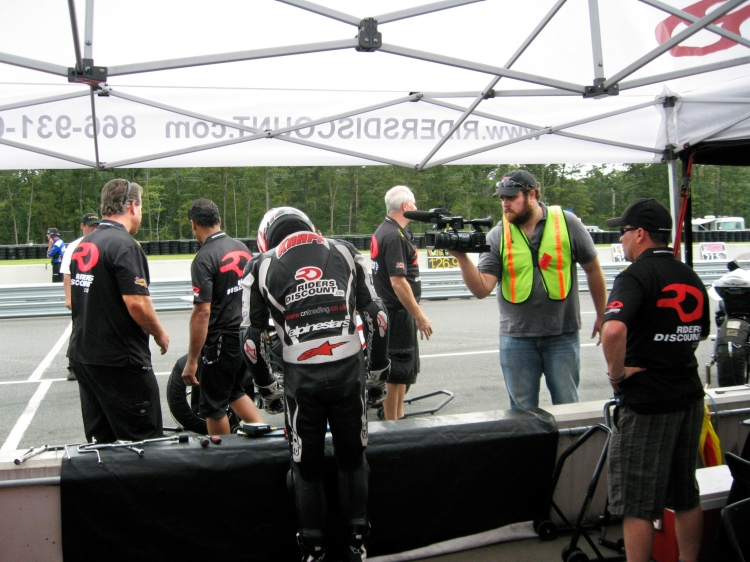
By
Assistant Professor of Communication Matt Sienkiewicz spent five years capturing the joy and frustration of a small company determined to remake the motorcycle industry and grab a piece of the American dream.
Sienkiewicz partnered with a friend in videotaping the 126 employees behind Erik Buell Racing (EBR), a Wisconsin motorcycle manufacturer seeking to defy industry expectations by creating a sport bike that could both win on professional race tracks and perform sharply on public streets.
The documentarians distilled 70 hours of videotape recordings into an hour-long presentation, “Ragged Edge,” that will debut this Friday at 10 p.m. on Wisconsin Public Television and is also available on Vimeo on Demand [vimeo.com/ondemand/theraggededge].
“Ragged Edge” showcases significant business decisions and human interactions with the exception of one momentous, and poignant, development: Just last month, not long after Sienkiewicz and his partner, Joseph Sousa, had wrapped production, EBR halted operations at its East Troy, Wis., plant and filed for receivership.
No matter how fast his motorcycles traveled, company founder Erik Buell couldn’t elude the hard crashes of business. Outstanding debt, weak sales and lack of interest from prospective investors conspired to end EBR’s journey before it could reach its dream.
Even though “Ragged Edge” doesn’t show the final days of business for Buell and his employees, Sienkiewicz says the documentary nonetheless captures the fundamental challenges facing many small ventures as they try to keep quick-trigger investors satisfied while attempting to stay true to their long-term plans.
“We wanted to show there’s something fundamentally wrong with the way investment takes place in America,” Sienkiewicz says. “There’s no place for companies that want to take the path of slow, steady growth. The system favors quick, fast results. Erik wanted to grow his company over a long period of time.”
Sousa met the motorcycle designer while working on a History Channel show and recognized the potential of following Buell as he started EBR in 2009 after Harley Davidson closed his previous venture. Sousa called Sienkiewicz, who at the time was working on his doctorate at University of Wisconsin-Madison, and told him he should visit EBR’s plant to gauge whether they had something worthy to document.
Sienkiewicz was struck by how EBR could design motorcycle components as if it were a large manufacturer with money to spare – a “little engine that could” aspect that lends itself to documentaries. And Buell himself “is a thoughtful guy,” Sienkiewicz said. “He can see the forest for the trees. He can see how motorcycles work but he also sees the struggles and weaknesses that come with running a relatively small business. He’s self-aware, and that’s what makes him perfect for this.”
“Ragged Edge” aims to “show the intersection of big economic questions and little ones,” Sienkiewicz says. “A big one is, ‘How does this country support manufacturing?’ A little one is, ‘How does a family that’s dependent on a manufacturing job support itself?’”
The documentary also highlights the culture of motorcycles – something that may be lost on some New Englanders. But it’s a way of life for the people who ride them and those who make them, Sienkiewicz says: “Motorcycles are a symbol of freedom, ingenuity and creativity.”
Even though Sienkiewicz and Sousa had Buell’s blessing to record everything, they still had to win the trust of EBR employees and assure them that while the documentary intended to explore pre-established themes, it would also fairly present their lives.
“If you’re doing a documentary honestly, you can’t explain to your subject every little tactical decision you’ll make. That will ruin it,” Sienkiewicz says. “But you can show them what you’re doing and ask that they trust you. This company was more than a company to the local community, and we wanted to express the difference in jobs where the money structure cares about employees and jobs where the money structure doesn’t care.”



